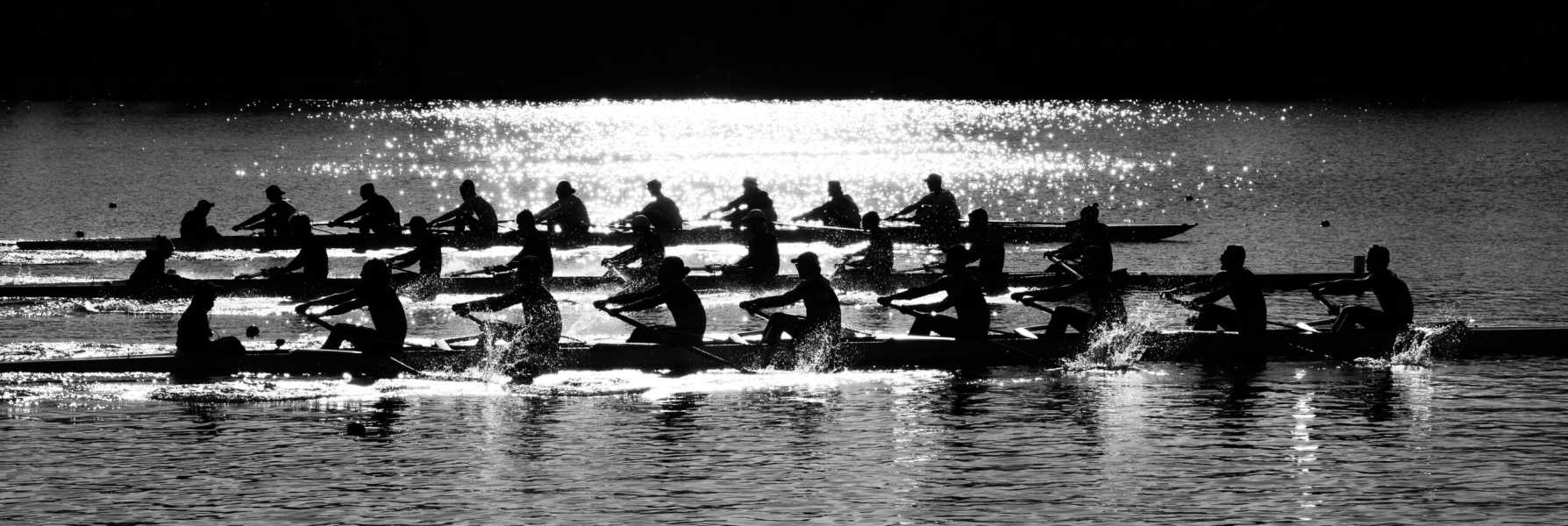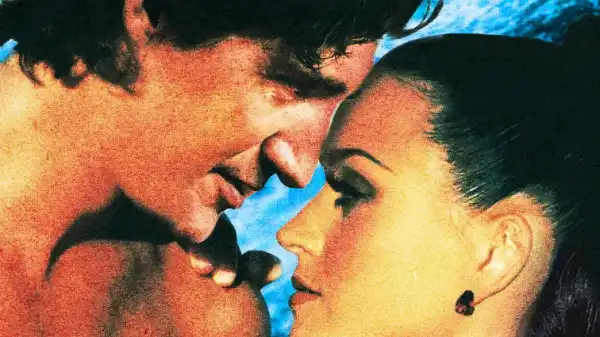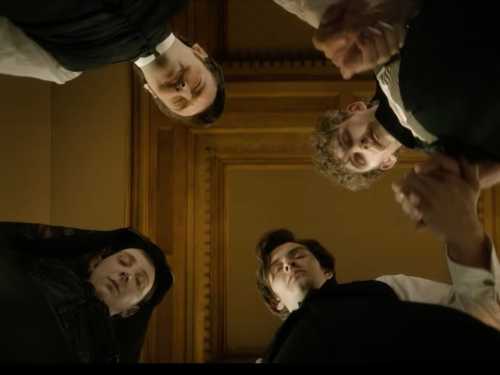The singular moment captured in George Clooney’s The Boys in the Boat may have marked the high point of American civilization.

(Glen Stewart/Shutterstock)
America is the land of plain speech, and George Clooney is vying for a place of honor among the great American artists. When he offers you a movie called The Boys in the Boat, you can be damn sure you’ll be treated to 124 minutes of just that: boys in a boat.
Clooney’s retelling of the story of the 1936 U.S. Olympic rowing team has largely been dismissed by professional critics as an undaring feel-good sports flick. Some of that is true: One of the most striking aspects of The Boys in the Boat is just how much of its two-hour runtime takes place on the water. It is very much a movie about a rowing team, with few artistic frills. Most of the action follows a familiar formula (even as it hews closely to a real historical source) and it plays on easy emotions.
That in itself is worth considering, given that the movie has proven surprisingly popular. The Boys in the Boat’s actual returns on opening weekend were nearly double the upper limit of the projected range; audience reviews on Google average 4.5 stars out of 5, with a remarkable 97 percent audience score on Rotten Tomatoes, the internet’s leading review aggregation site. If The Boys in the Boat is “conventional”—the harshest insult certain circles can conceive—then it seems American moviegoers are itching for a return to normalcy.
There is something to be said for playing it safe. The writing may be a little stiff, but the shots are gripping (for the most part) and the characters are charming. The race scenes in particular are paced almost perfectly, striking a real nervous energy in viewers who have managed to avoid any spoilers. Joel Edgerton has always been a bit of a man out of time, cut from the same cloth as some of old Hollywood’s greatest leading men; he is in peak form as coach Al Ulbrickson, managing a magnetic depiction of a kind of American virtue that seems to belong firmly to the past. (It is not worth dwelling too much on the fact that Edgerton is Australian while the film’s lead, Callum Turner, is British.) The relationships on screen are surprisingly complex at points, especially those between Edgerton’s Ulbrickson and his colleagues, rivals, and rowers.
The film is quietly reactionary in ways that extend beyond mere form, though. The viewer does not have to reach far for a political interpretation of The Boys in the Boat. There is the real aspirational populism that marks much of Clooney’s work (despite his real-life, hardline membership in the country’s left-wing elite) which is a central theme of the first and second acts. Joe Rantz, the film’s primary focus, was abandoned by his father and stepmother just as he was turning fourteen. He raised himself in abject poverty, and joined the rowing team only in search of a room and a part-time job. Rantz and his teammates at the University of Washington stand in marked contrast to the well-heeled rowers of the East Coast schools, and their upset victory affirms the character of America in Clooney’s moral universe as the working man’s republic. Addressing a radio audience as the crew prepares to travel to Berlin, Ulbrickson describes them not just as “Washington’s boys,” not just as “my boys,” but as “this country’s boys.”
In the third act, then, the populist sentiment is rolled into a stirring patriotism. In The Boys in the Boat, the ‘36 Olympics serve the same role they have long served in American mythology: as the moment the new world power, destined to rise in the twentieth century and beyond, asserted itself against the backwards and decaying empires of the old world. Viewers of good humor are treated to a delightful sequence of der Fuhrer coping and seething as the American boys clinch victory, which one reviewer derided as a “cardboard cameo.” That moment, the film’s climax, is exhilarating, provided the audience does not take itself too seriously. The sense that 1936 marks the rise of a new order and the passing of an old one is given a definite embodiment in George Yeomans Pocock, a real-life British-born shipmaker who serves as a mentor and surrogate father to Rantz.
But in its escalation from historical retelling to patriotic mythmaking, The Boys in the Boat detaches itself from the American mainstream—in fact, from the American sensibility as it actually exists in 2023. There is no retconning of any of the rowers as a member of any privileged minority, though there is an awkwardly shoehorned appearance by Jesse Owens. There is nothing approaching the gender-bending that has become de rigueur in Hollywood; in fact, the only two female characters of any note are fiercely anti-feminist archetypes who serve mainly to support their respective partners, Ulbrickson and Rantz.
The Boys in the Boat, that is, depicts America as it actually existed at one of its finest moments—America as it might have been. That is why the people of this country were so taken with it, and why the critics of New York and LA felt compelled to trash it. And it is why we can hope little that more of its like might await us in the new year and beyond.
Hed: This Country’s Boys
Dek: The singular moment captured in George Clooney’s The Boys in the Boat may have marked the high point of American civilization.
America is the land of plain speech, and George Clooney is vying for a place of honor among the great American artists. When he offers you a movie called The Boys in the Boat, you can be damn sure you’ll be treated to 124 minutes of just that: boys in a boat.
Clooney’s retelling of the story of the 1936 U.S. Olympic rowing team has largely been dismissed by professional critics as an undaring feel-good sports flick. Some of that is true: One of the most striking aspects of The Boys in the Boat is just how much of its two-hour runtime takes place on the water. It is very much a movie about a rowing team, with few artistic frills. Most of the action follows a familiar formula (even as it hews closely to a real historical source) and it plays on easy emotions.
That in itself is worth considering, given that the movie has proven surprisingly popular. The Boys in the Boat’s actual returns on opening weekend were nearly double the upper limit of the projected range; audience reviews on Google average 4.5 stars out of 5, with a remarkable 97 percent audience score on Rotten Tomatoes, the internet’s leading review aggregation site. If The Boys in the Boat is “conventional”—the harshest insult certain circles can conceive—then it seems American moviegoers are itching for a return to normalcy.
There is something to be said for playing it safe. The writing may be a little stiff, but the shots are gripping (for the most part) and the characters are charming. The race scenes in particular are paced almost perfectly, striking a real nervous energy in viewers who have managed to avoid any spoilers. Joel Edgerton has always been a bit of a man out of time, cut from the same cloth as some of old Hollywood’s greatest leading men; he is in peak form as coach Al Ulbrickson, managing a magnetic depiction of a kind of American virtue that seems to belong firmly to the past. (It is not worth dwelling too much on the fact that Edgerton is Australian while the film’s lead, Callum Turner, is British.) The relationships on screen are surprisingly complex at points, especially those between Edgerton’s Ulbrickson and his colleagues, rivals, and rowers.
The film is quietly reactionary in ways that extend beyond mere form, though. The viewer does not have to reach far for a political interpretation of The Boys in the Boat. There is the real aspirational populism that marks much of Clooney’s work (despite his real-life, hardline membership in the country’s left-wing elite) which is a central theme of the first and second acts. Joe Rantz, the film’s primary focus, was abandoned by his father and stepmother just as he was turning fourteen. He raised himself in abject poverty, and joined the rowing team only in search of a room and a part-time job. Rantz and his teammates at the University of Washington stand in marked contrast to the well-heeled rowers of the East Coast schools, and their upset victory affirms the character of America in Clooney’s moral universe as the working man’s republic. Addressing a radio audience as the crew prepares to travel to Berlin, Ulbrickson describes them not just as “Washington’s boys,” not just as “my boys,” but as “this country’s boys.”
Subscribe Today Get daily emails in your inbox Email Address:
In the third act, then, the populist sentiment is rolled into a stirring patriotism. In The Boys in the Boat, the ‘36 Olympics serve the same role they have long served in American mythology: as the moment the new world power, destined to rise in the twentieth century and beyond, asserted itself against the backwards and decaying empires of the old world. Viewers of good humor are treated to a delightful sequence of der Fuhrer coping and seething as the American boys clinch victory, which one reviewer derided as a “cardboard cameo.” That moment, the film’s climax, is exhilarating, provided the audience does not take itself too seriously. The sense that 1936 marks the rise of a new order and the passing of an old one is given a definite embodiment in George Yeomans Pocock, a real-life British-born shipmaker who serves as a mentor and surrogate father to Rantz.
But in its escalation from historical retelling to patriotic mythmaking, The Boys in the Boat detaches itself from the American mainstream—in fact, from the American sensibility as it actually exists in 2023. There is no retconning of any of the rowers as a member of any privileged minority, though there is an awkwardly shoehorned appearance by Jesse Owens. There is nothing approaching the gender-bending that has become de rigueur in Hollywood; in fact, the only two female characters of any note are fiercely anti-feminist archetypes who serve mainly to support their respective partners, Ulbrickson and Rantz.
The Boys in the Boat, that is, depicts America as it actually existed at one of its finest moments—America as it might have been. That is why the people of this country were so taken with it, and why the critics of New York and LA felt compelled to trash it. And it is why we can hope little that more of its like might await us in the new year and beyond.
Sourse: theamericanconservative.com






